…das ist unser Sankt Pauli! Der FC St. Pauli schlägt den 1. FC Heidenheim. Was für ein wichtiger Sieg! In einem Spiel, welches mit dem Begriff selbst rein gar nichts mehr zu tun hatte. Der FCSP verrichtete Schwerstarbeit und darf nach einer enorm konzentrierten und geduldigen Leistung letztlich verdient die drei Punkte am Millerntor behalten und sich darüber freuen, die Länderspielpause auf einem Aufstiegsplatz zu verbringen.
(Titelbild: Peter Böhmer)
Die Aufstellung
Wie erwartet gab es beim FC St. Pauli im Vergleich zur zweiten Halbzeit gegen Dynamo Dresden keine Veränderungen in der Startelf. Das bedeutete, dass Eric Smith nach längerer Abstinenz wieder in der Startelf stand. Dadurch rückte Jackson Irvine von der Sechserposition wieder etwas weiter nach vorne und verdrängte dort Christopher Buchtmann aus der Anfangsformation.
Damit gab es Bemerkenswertes: Keiner der Spieler in der Anfangsformation stand vor knapp zwei Jahren, also als das Millerntor zuletzt keine Zuschauerbeschränkungen hatte, bereits beim FC St. Pauli unter Vertrag. Der gestrige Abend machte mal wieder bewusst, welch krasser Umbruch am Millerntor stattgefunden hat.
Beim 1. FC Heidenheim gab es dagegen sehr viel mehr Veränderungen in der Startelf: Dženis Burnić, Marvin Rittmüller, Andreas Geipl und Patrick Mainka kamen für Marnon Busch (gesperrt), Kevin Sessa (verletzt), Jonas Föhrenbach (verletzt) und Jan Schöppner (Bank) in die Startelf.
Das Team formierte sich dann mit einer Dreierkette, genauer einem 3-5-2 gegen die Raute des FC St. Pauli. Für den 1. FC Heidenheim ist das eine eher ungewohnte Formation (mit der ich im Vorbericht nicht gerechnet hatte). So richtig spürbar war aber nicht, dass es für das Team ungewohnt war. Denn die defensive Arbeit verrichtete das Team von Frank Schmidt enorm gut organisiert und diszipliniert.
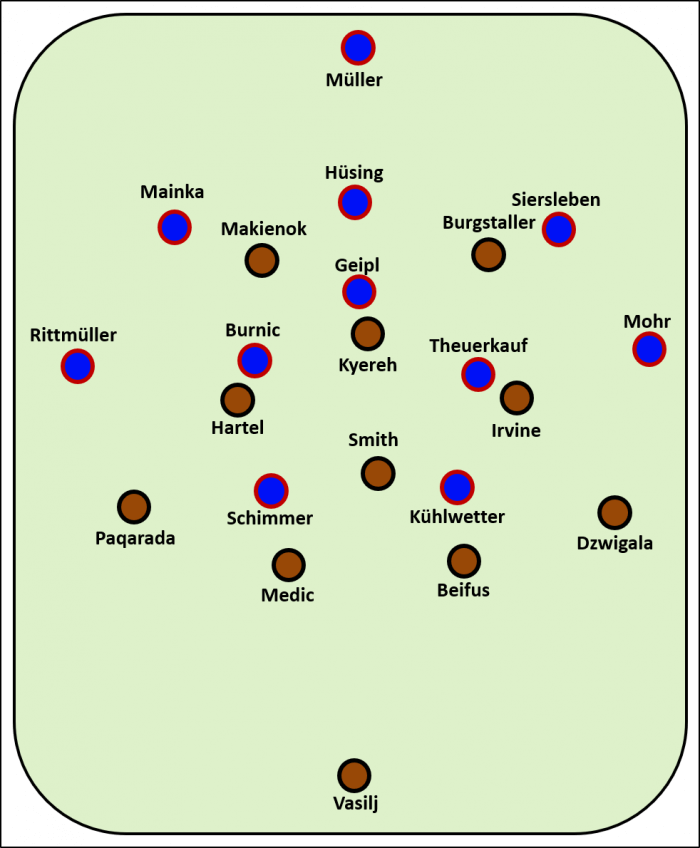
Heidenheim macht es fast perfekt
Dieser Bericht wird sich hauptsächlich mit der Heidenheimer Defensivarbeit und der Reaktion des FC St. Pauli darauf befassen. Denn die nach xG beste Defensive der Liga zeigte eindrucksvoll, warum sie eben jenen Titel zurecht trägt. Der FCH war sehr gut eingestellt auf das Spiel des FC St. Pauli. Timo Schultz hob auf der Pressekonferenz nach dem Spiel unter anderem auch die gute Kommunikation innerheralb des Heidenheimer Teams hervor und betonte, welch schwere Nuss seine Elf zu knacken hatte.
Das 3-5-2 des 1. FC Heidenheim zeigte sich auf alle Bereiche des FC St. Pauli sehr gut eingestellt. Gegen die beiden Innenverteidiger und Sechser Smith stellten sich die beiden Stürmer Kühlwetter und Schimmer. Die beiden hielten den Abstand untereinander gering, sodass sie zum einen die vertikalen Passwege für Beifus und Medić zustellten und zusätzlich noch Smith in ihrem Deckungsschatten hielten. So konnten zwei Spieler recht gut drei Spieler des FC St. Pauli in Schach halten, auch wenn sie die Innenverteidiger dadurch nicht druckvoll Anlaufen konnten.
Eine Reihe weiter hinten, agierte Heidenheim mit starker Mannorientierung. Die beiden Flügelverteidiger Mohr und Rittmüller hielten den Abstand auf Paqarada und Dźwigała immer sehr klein, sodass ein kontrollierter Aufbau über die beiden Außenverteidiger für den FC St. Pauli nicht möglich war.
Auch von den beiden Achter-Positionen konnte für den Spielaufbau nicht viel ausgehen, denn Jackson Irvine und Marcel Hartel wurden sogar noch enger bewacht als die Außenverteidiger. Burnić und Theuerkauf waren wirklich bemerkenswert eng dran an den beiden. FCH-Trainer Schmidt dazu später: „Je näher wir zum eigenen Tor kamen, umso mannorientierter wollten wir im zentralen Mittelfeld spielen.„
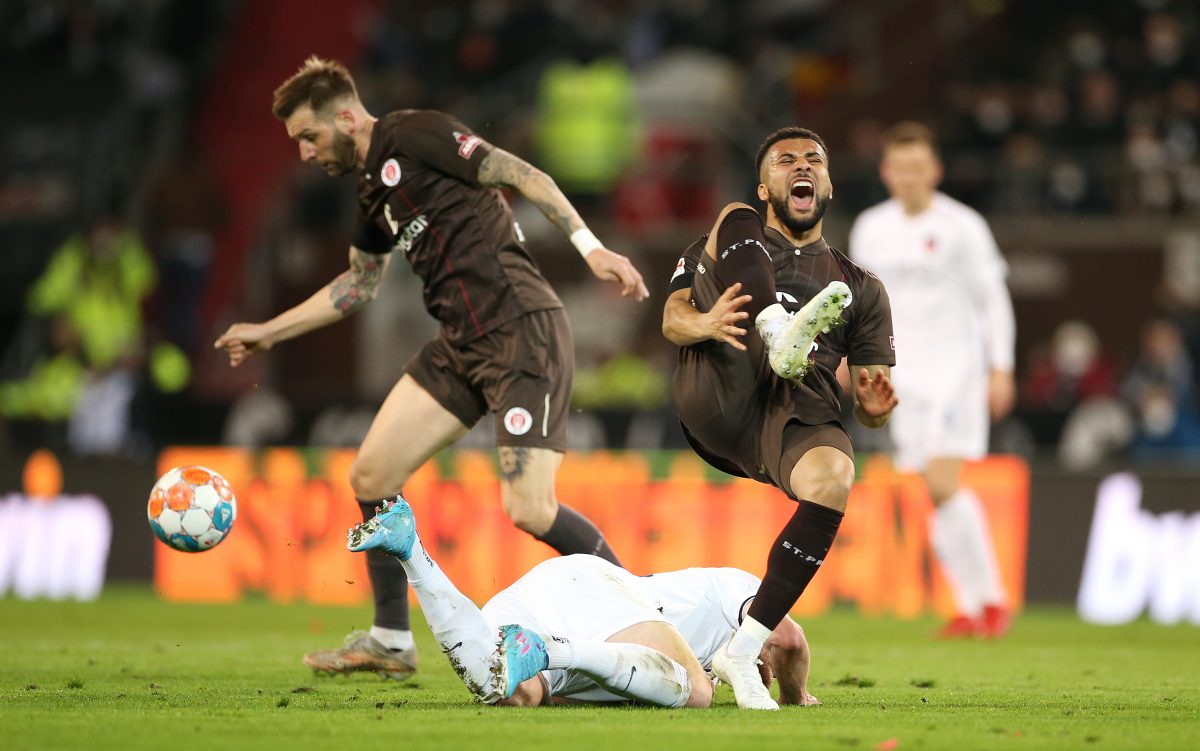
(Cathrin Mueller/Getty Images/via OneFootball)
Da blieb auf den ersten Blick dann eigentlich nur noch die Exit-Strategie für den FC St. Pauli, also lange Bälle auf Makienok. Aber das geschickte Zustellen mit einem Mann weniger in vorderster Reihe hatte für Heidenheim den großen Vorteil, dass sie an anderer Stelle in Überzahl agieren konnten. Bei Ballbesitz des FCSP ließ sich Sechser Andreas Geipl immer mit nach hinten fallen, wodurch das offensive Dreieck des FC St. Pauli gegen gleich vier Heidenheimer agieren musste.
Der lange Ball auf Makienok, eigentlich eine gute Option, wenn die Außenverteidiger und Achter aus dem Spiel genommen werden, war weit nicht so effektiv, wie zuletzt. Denn Heidenheim konnte aufgrund der Überzahl nahezu alle zweiten Bälle gewinnen. Frank Schmidt sagte nach dem Spiel, dass ihm diese Überzahl in letzter Reihe enorm wichtig war und diese Priorität zahlte sich in der ersten Halbzeit definitiv aus.
Neutralisation und vermeintliches Handspiel
Es kam dann in der ersten Halbzeit zu einer klassischen Patt-Situation. Der 1. FC Heidenheim arbeitete defensiv äußerst diszipliniert und ging offensiv sehr wenig ins Risiko. Der FC St. Pauli versuchte viel, ging offensiv aber auch nicht ins Risiko, was angesichts der Stärke der Heidenheimer in Umschaltmomenten und der Probleme des FCSP in eben jenen Momenten, auch ratsam war. Daher entwickelte sich ein Abnutzungskampf samt vielen Nickeligkeiten in den direkten Duellen.
Das große Thema aus Heidenheimer Sicht nach Abpfiff war dann eine Szene aus der 22. Spielminute: Eine Flanke landete bei Medić auf dem Arm. Weder im Stadion noch anhand der TV-Bilder ist für mich auszumachen, ob der Ball vorher per Kopf berührt wird. Die Heidenheimer hätten dafür gerne einen Elfmeter gehabt. Sie bekamen stattdessen ganz starke Worte von Timo Schultz auf der Pressekonferenz:
„Durch die letzten zwei Jahre ist es mit der Handspielregel ein Durcheinander geworden, dass da kein Mensch mehr mit glücklich wird und als letztes die Schiedsrichter. (…) Ich find es eher traurig, dass wir über solche Szenen diskutieren müssen. In einem Punkt hat Frank Schmidt zu 100% Recht: Solche Elfmeter werden permanent gegeben. (…) Aber sollen sich die Spieler die Hand abhacken oder damit dauerhaft hinterm Rücken rumlaufen? Ich glaube wir müssen in der grundsätzlichen Herangehensweise an diese Regel etwas ändern, uns mehr fragen, ob es Absicht war. (…) Vielleicht können wir die Regel revolutionieren und sagen, dass es einen indirekten Freistoß gibt bei solchen Situationen. (…) Kein Mensch will solche Elfmeter gegen sich haben. Das Problem ist aber, dass sie permanent gepfiffen werden.“
Timo Schultz über das vermeintlich regelwidrige Handspiel von Jakov Medić
Zurück zum Spiel:
Ich finde, dass kein Gegner des FC St. Pauli in dieser Saison besser auf alle Stärken des Teams reagiert hat, als der 1. FC Heidenheim. Der Sechserraum wurde kontrolliert, die beiden Achter zugestellt, die Außenverteidiger wurden aggressiv angelaufen und die Verteidigung gegen lange Bälle gelang, weil das Team in der Defensive eine Überzahl hatte. Auf alle Optionen des FCSP-Spiels hatte Heidenheim eine passende Antwort präsentiert. Das fand ich unfassbar stark und diese Defensivarbeit war dann fast so etwas wie eine Kunstform für sich. Was aber mindestens genauso stark war: Die Antworten, die der FC St. Pauli mit zunehmender Spieldauer darauf hatte.
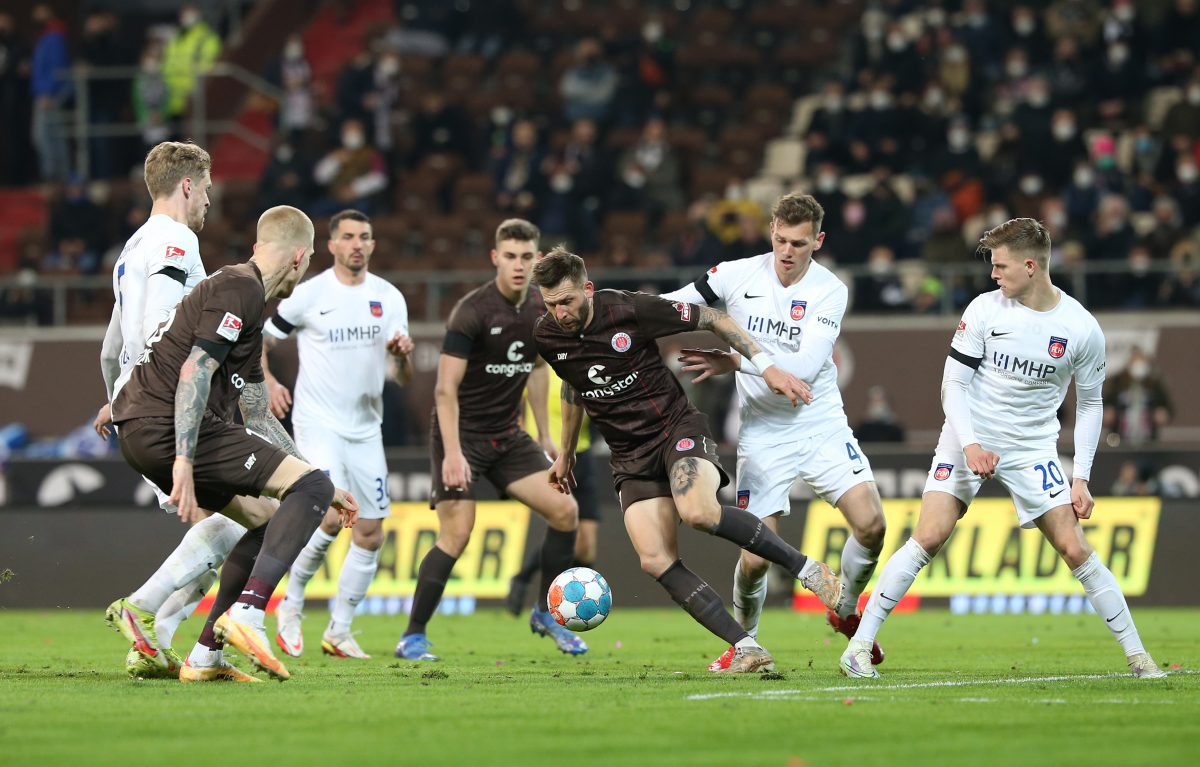
(Cathrin Mueller/Getty Images/via OneFootball)
Der FCSP findet Antworten auf die Heidenheimer Perfektion
Denn während es in der ersten Halbzeit eigentlich nur zwingende Chancen für die Heidenheimer gab (nach Umschaltmomenten bzw. zweiten Bällen), arbeitete sich der FCSP auch dank einiger Umstellungen immer besser in das Spiel herein.
Als Reaktion auf das simple Zustellen der Passoption auf Eric Smith fiel eben jener einfach zwischen die beiden Innenverteidiger. Das hatte auch den Vorteil, dass bei Ballverlust gleich drei Spieler hinter den beiden Heidenheimer Stürmern standen, wie Timo Schultz nach dem Spiel erzählte. Eine weitere Reaktion war dann, dass sich Jackson Irvine in den Sechserraum bewegte, wenn Smith zwischen die Innenverteidiger fiel (Schultz dazu: „Aufgrund ihrer Mannorientierung mussten sie mit der Umstellung von Jackson Irvine auf die Zehn (Anm.: Für mich ist das der Sechserraum) Räume dahinter freigeben.“ – Mit „Räume dahinter freigeben“ meinte Schultz, dass Theuerkauf den Weg von Irvine mitging und dadurch einer der Halbräume frei wurde.
Für den Spielaufbau gewinnbringend wurde diese Umstellung dann insbesondere durch eine weitere Anpassung: Zu Spielbeginn versammelten sich Makienok, Burgstaller und Kyereh sehr oft zusammen im Zentrum, um dort eine gute Positionierung für lange Bälle zu haben. Mit zunehmender Spieldauer zogen die Drei aber immer breiter. Das bedeutet, dass sich weniger ein Dreieck (= zwei Stürmer, ein Zehner), sondern eher eine Dreierreihe mit einem zentralen und zwei Außenstürmern bildete.
Durch diese Umstellung wurde die Heidenheimer Defensive vor Aufgaben gestellt, denn die drei Innenverteidiger hätten nun ebenfalls in die Breite ziehen müssen. Und da das bei einer Dreierreihe in der Defensive eine blöde Idee ist, weil dann die Abstände zu groß werden, waren die Flügelverteidiger gezwungen sich etwas mehr nach hinten zu orientieren. Das hatte dann aber zur Folge, dass es mehr Raum für die Außenverteidiger des FCSP gab. Und schwupps, konnte sich der FC St. Pauli vor allem zu Beginn der zweiten Halbzeit ein klares Übergewicht erspielen.
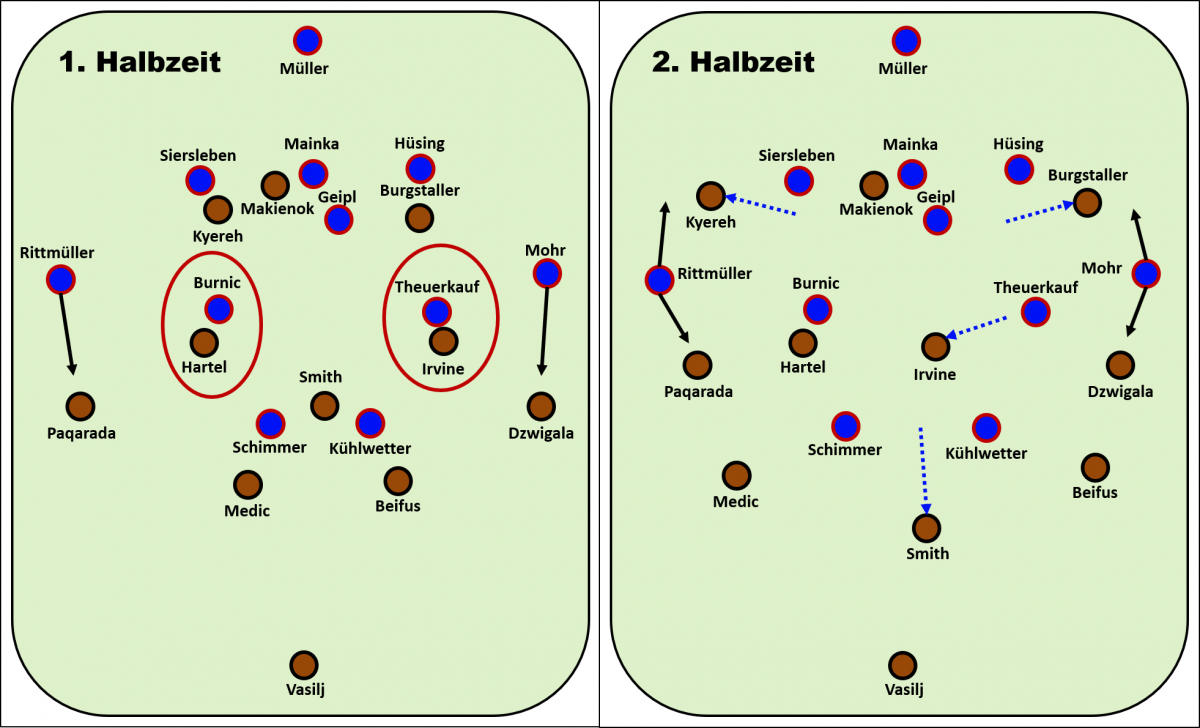
links: In der ersten Halbzeit agierte Heidenheim mit Überzahl in letzter Reihe und mannorientiert im Mittelfeld.
rechts: Durch Umstellungen konnte der FC St. Pauli das Heidenheimer Defensivverhalten vor Probleme stellen und sich mehr Räume erschaffen.
Aber es waren nicht nur die taktischen Umstellungen, die letztlich den Erfolg für den FC St. Pauli brachten. Denn gegen Mannorientierungen gibt es ein simples wie effektives Rezept: Man muss die direkten Duelle einfach gewinnen. Genau das gelang dann in der zweiten Halbzeit viel besser, weil es etwas mehr Raum gab und der Heidenheimer Zugriff leicht verspätet einsetzte.
Wenig verwunderlich ist dann, dass die drei Spieler mit der womöglich größten spielerischen Qualität beim FC St. Pauli für das Tor des Tages verantwortlich waren: Marcel Hartel zeigte einen guten Laufweg und schuf so Raum für Paqarada, den er mit einem Pass gegen die Laufrichtung der gesamten Defensive fand. Paqarada zeigte mal wieder, dass es beim FC St. Pauli endlich mal einen Außenverteidiger gibt, der richtig gute Flanken schlagen kann. Schon neun Torvorlagen hat er diese Saison geliefert. Acht davon waren Flanken (zwei per Ecke). Und die Bewegung im Raum von Kyereh ist einfach bundesligareif.
Was mich bei diesem Spiel auf Seiten des FC St. Pauli am meisten beeindruckte, war die Geduld mit der agiert wurde. Denn klar war auch: Wenn das Team offensiv zu sehr ins Risiko gegangen wäre, hätte Heidenheim es womöglich bestraft. Es galt nicht den Kopf zu verlieren und trotzdem offensiv zwingender zu werden. Es war ein ständiges Abwägen, wie viel Risiko in der Offensive angebracht war. Ein echtes Geduldsspiel, welches enormes Vertrauen in die eigene Stärke verlangte. Gerade die eigene Ungeduld, das zu hohe Risiko in der Offensive wurde dem FCSP in dieser Saison nicht nur einmal zum Verhängnis.
Nach der Führung des FC St. Pauli baute Heidenheim auf eine Viererkette um. Malone und Leipertz kamen ins Spiel und stellten sich auf den Außenbahnen extrem offensiv auf. So boten sich zwangsläufig Räume für den FCSP. Chancen in Umschaltmomenten waren die Folge, aber die frühzeitige Entscheidung blieb aus.
Stattdessen stellte der FCSP schon frühzeitig in den Nachspielzeit-Modus und fing schon in der 85. Minute an die eigenen Ecken zum Zeitspiel zu nutzen. Das war dann doch etwas früh und Timo Schultz hatte alle Hände voll zu tun seinem Team immer wieder anzuzeigen, dass es sich gefälligst nicht so tief fallen lassen soll bei Heidenheimer Ballbesitz.
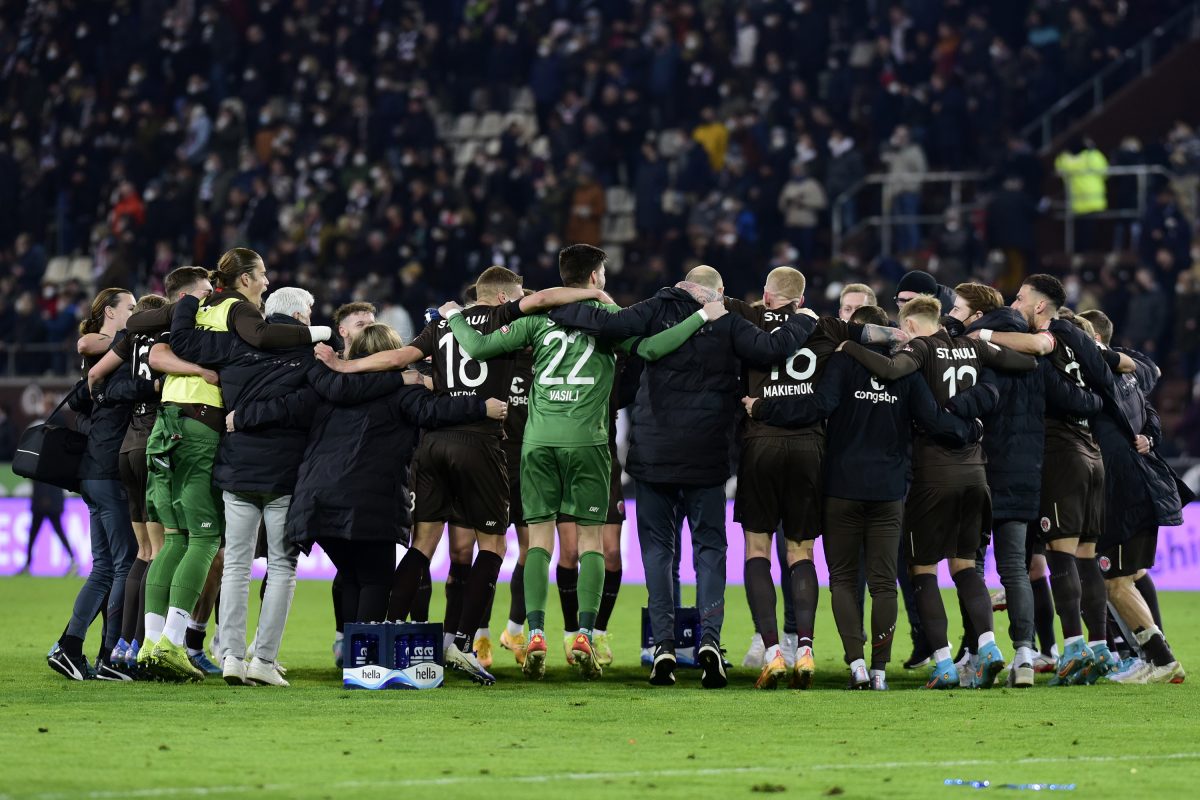
(c) Peter Böhmer
Doch nicht nur Heidenheim zeigte eine disziplinierte und konzentrierte Leistung in der Defensive. Auch der FCSP verteidigte enorm stark und ließ in der zweiten Halbzeit (abgesehen vom Latten-Kopfball durch den eingewechselten Kleindienst) nur sehr wenige Heidenheimer Chancen zu. Die „Null“ hatte sich das Team durch Schwerstarbeit hochverdient.
Es mag nicht der größte spielerische Leckerbissen in dieser Saison gewesen sein. Aber Schönheit liegt ja auch immer im Auge der Betrachter. Die Geduld mit der das Team trotz des starken gegnerischen Defensivverhaltens agierte, fand ich sehr beeindruckend. Eine wirklich reife Leistung. Und in der jetzigen Situation ist es auch einfach mal egal, wie schön das nun aussieht oder eben nicht. Denn auch ein Arbeitssieg wird mit drei Punkten entlohnt!
Nach dem Hinspiel biss ich mir noch auf die Zunge bzw. klebte mir die Finger ab. Der Titel des Spielberichts damals lautete: So spielt ein Aufs… gewinnt man in Heidenheim!
Nun, nach dieser wirklich reifen Leistung, nach diesem enormen Geduldsspiel, bei dem der FC St. Pauli nie die Konzentration verlor und bis zuletzt diszipliniert agierte, schreibe ich ganz offen: So spielt ein Aufsteiger!
Immer weiter vor!
//Tim
Alle Beiträge beim MillernTon sind gratis. Wir freuen uns aber sehr, wenn Du uns unterstützt.
MillernTon auf BlueSky // Mastodon // Facebook // Instagram // Threads // WhatsApp // YouTube
{:}{:en}…that’s our St. Pauli! FC St. Pauli beats 1. FC Heidenheim. What an important victory! In a game that had absolutely nothing to do with the term itself. FC St. Pauli worked hard and, after an enormously concentrated and patient performance, deserved to keep the three points at the Millerntor and be happy to spend the international break in a promotion place.
(Cover picture: Peter Böhmer)
The line-up
As expected, FC St. Pauli made no changes to their starting eleven compared to the second half against Dynamo Dresden. This meant that Eric Smith was back in the starting eleven after a long absence. As a result, Jackson Irvine moved a little further forward from the sixth position again, displacing Christopher Buchtmann from the starting line-up there.
There was something remarkable about this: none of the players in the starting line-up had been under contract with FC St. Pauli almost two years ago, i.e. when the Millerntor last had no spectator restrictions. Yesterday evening made us aware once again of the radical change that has taken place at the Millerntor.
1. FC Heidenheim, on the other hand, had many more changes in the starting eleven: Dženis Burnić, Marvin Rittmüller, Andreas Geipl and Patrick Mainka came in for Marnon Busch (suspended), Kevin Sessa (injured), Jonas Föhrenbach (injured) and Jan Schöppner (bench).
The team then formed a three-man backline, more precisely a 3-5-2 against the diamond of FC St. Pauli. This is a rather unusual formation for 1. FC Heidenheim (which I had not expected in the preliminary report). But it was not really noticeable that it was unusual for the team. Frank Schmidt’s team was extremely well organised and disciplined in their defensive work.

Heidenheim almost makes it perfect
This report will mainly deal with Heidenheim’s defensive work and FC St. Pauli’s reaction to it. Because the best defence in the division according to xG showed impressively why they rightly bear that very title. The FCH was very well adjusted to the FC St. Pauli game. At the post-match press conference, Timo Schultz emphasised the good communication within the Heidenheim team and what a tough nut his team had to crack.
The 3-5-2 of 1. FC Heidenheim showed itself very well adjusted to all areas of FC St. Pauli. Against the two centre-backs and six-man Smith, the two strikers Kühlwetter and Schimmer lined up. The two kept the distance between them small so that on the one hand they blocked the vertical passing routes for Beifus and Medić and additionally kept Smith in their cover shadow. In this way, two players were able to keep three FC St. Pauli players in check quite well, even if they were unable to pressure the centre-backs.
One row further back, Heidenheim operated with a strong man-orientation. The two wing-backs Mohr and Rittmüller always kept the distance to Paqarada and Dźwigała very small, so a controlled build-up via the two wing-backs was not possible for FC St. Pauli.
Not much could come from the two eighth positions for the build-up of play either, as Jackson Irvine and Marcel Hartel were even more closely guarded than the wing-backs. Burnić and Theuerkauf were really remarkably close to both of them. FCH coach Schmidt commented later: „The closer we got to our own goal, the more man-oriented we wanted to play in central midfield.“

(Cathrin Mueller/Getty Images/via OneFootball)
At first glance, the only exit strategy left for FC St. Pauli was to play long balls to Makienok. But the skilful passing with one man less in the front line had the big advantage for Heidenheim that they could act in superior numbers elsewhere. When FCSP had possession of the ball, six-man Andreas Geipl always dropped back, which meant that FC St. Pauli’s offensive triangle had to act against four Heidenheim players.
The long ball to Makienok, actually a good option when the full-backs and eights are taken out of the game, was not as effective as it had been recently. This was because Heidenheim was able to win almost all second balls due to their superior numbers. Frank Schmidt said after the game that this last-row superiority was enormously important to him and this priority definitely paid off in the first half.
Neutralisation and alleged handball
It then came to a classic stalemate in the first half. FC Heidenheim was extremely disciplined defensively and took very few risks offensively. FC St. Pauli tried a lot but did not take any offensive risks, which was advisable in view of Heidenheim’s strength in switching moments and FCSP’s problems in those very moments. Therefore, a battle of attrition developed, including a lot of nickels and dimes in the direct duels.
After the final whistle, the big topic from Heidenheim’s point of view was a scene from the 22nd minute: A cross landed on Medić’s arm. Neither in the stadium nor from the TV pictures can I make out whether the ball was touched by the head beforehand. The Heidenheim team would have liked to have had a penalty for that. Instead, they got very strong words from Timo Schultz at the press conference:
„In the last two years, the handball rule has become such a mess that no one is happy with it anymore, and the referees are the last ones to be happy. (…) I find it rather sad that we have to discuss such scenes. Frank Schmidt is 100% right about one thing: such penalties are always given. (…) But should the players chop off their hands or walk around with them behind their backs all the time? I think we have to change our basic approach to this rule, ask ourselves more whether it was intentional. (…) Maybe we can revolutionise the rule and say that there is an indirect free kick in such situations. (…) Nobody wants to have such penalties against them. But the problem is that they are whistled all the time.“
Timo Schultz on Jakov Medić’s alleged handball against the rules
Back to the game:
I think that no FC St. Pauli opponent this season has responded better to all the team’s strengths than 1. FC Heidenheim. The six-man area was controlled, the two eights were blocked, the full-backs were tackled aggressively and the defence against long balls succeeded because the team had an overabundance in defence. Heidenheim had a suitable answer to all options of the FCSP game. I found that incredibly strong and this defensive work was then almost something like an art form in itself. But what was at least as strong: FC St. Pauli’s answers to that as the game went on.

(Cathrin Mueller/Getty Images/via OneFootball)
FCSP find answers to Heidenheim’s perfection
While in the first half there were only compelling chances for the Heidenheim team (after switching moments or second balls), FCSP got better and better into the game, also thanks to some changes.
In response to the simple passing option to Eric Smith, the latter simply fell between the two centre-backs. This also had the advantage that when the ball was lost, there were three players behind the two Heidenheim strikers, as Timo Schultz told us after the game. Another reaction was then that Jackson Irvine moved into the six-man area when Smith fell between the centre-backs (Schultz on this: „Because of their man-orientation, they had to free up spaces behind with the switch of Jackson Irvine to the ten (note: for me, that’s the six-man area).“ – By „freeing up spaces behind“ Schultz meant that Theuerkauf went the way of Irvine, thus freeing up one of the half-spaces.
This change was particularly beneficial for the build-up play due to another adjustment: At the beginning of the game, Makienok, Burgstaller and Kyereh often gathered together in the centre in order to have a good position for long balls. As the game progressed, however, the three moved wider and wider. This meant that less of a triangle (= two strikers, one ten) was formed, but rather a three-man line with one central and two outfield strikers.
This change confronted the Heidenheim defence with tasks because the three centre-backs would now also have had to move out wide. And since that is a stupid idea with a three-man defence, because the distances become too big, the wing-backs were forced to orientate themselves a bit more to the back. The result was that there was more space for the FCSP wing-backs. And suddenly, FC St. Pauli had a clear advantage, especially at the beginning of the second half.

Left: In the first half, Heidenheim operated with superior numbers in the back row and was man-oriented in midfield.
right: By making changes, FC St. Pauli was able to pose problems to Heidenheim’s defensive behaviour and create more spaces for themselves.
But it was not only the tactical changes that ultimately brought success for FC St. Pauli. Because there is a simple and effective recipe against man-orientation: You simply have to win the direct duels. And that’s exactly what they did much better in the second half because there was a bit more space and Heidenheim’s grip was slightly delayed.
Little wonder then that the three players with possibly the greatest playing quality at FC St. Pauli were responsible for the goal of the day: Marcel Hartel showed a good running path and thus created space for Paqarada, whom he found with a pass against the running direction of the entire defence. Paqarada showed once again that FC St. Pauli finally has an outside defender who can hit really good crosses. He has already provided nine assists this season. Eight of them were crosses (two from corners). And Kyereh’s movement in space is simply top-flight-standard.
What impressed me most about FC St. Pauli in this match was the patience with which they acted. It was also clear that if the team had taken too many offensive risks, Heidenheim might have punished them. It was important not to lose one’s head and still become more compelling offensively. It was a constant weighing up of how much risk was appropriate in the offensive. It was a real game of patience that demanded enormous confidence in one’s own strength. It was precisely their own impatience, the excessive risk in the offensive that was the undoing of FCSP on more than one occasion this season.
After FC St. Pauli took the lead, Heidenheim switched to a four-man defence. Malone and Leipertz came into the game and positioned themselves extremely offensively on the flanks. This inevitably created spaces for FCSP. Chances in transition moments were the result, but the early decision did not come.
Instead, FCSP went into injury time mode early on and started to use their own corners for time play as early as the 85th minute. That was a bit early and Timo Schultz had his hands full telling his team not to drop so low when Heidenheim had the ball.

(c) Peter Böhmer
But not only Heidenheim showed a disciplined and concentrated performance in defence. FCSP also defended extremely well and allowed very few Heidenheim chances in the second half (apart from the crossbar header by substitute Kleindienst). The team had highly deserved the „zero“ through hard work.
It may not have been the greatest game of the season. But beauty is always in the eye of the beholder. I found the patience with which the team acted despite the strong defensive behaviour of the opponents very impressive. A really mature performance. And in the current situation, it doesn’t matter how good it looks or doesn’t look. Because even a work victory is rewarded with three points!
After the first leg, I bit my tongue and stuck my fingers together. The title of the match report at the time was: That’s how you get prom… to win in Heidenheim!
Now, after this really mature performance, after this enormous game of patience, in which FC St. Pauli never lost concentration and acted in a disciplined manner until the very end, I write quite openly: That’s how a to-be-promoted team plays!
Keep moving forward!
//Tim (translation by Arne)
MillernTon Twitter //
MillernTon YouTube //
MillernTon Facebook //MillernTon Instagram //
If you like what we do here, here you’ll find the information on how to support us.
{:}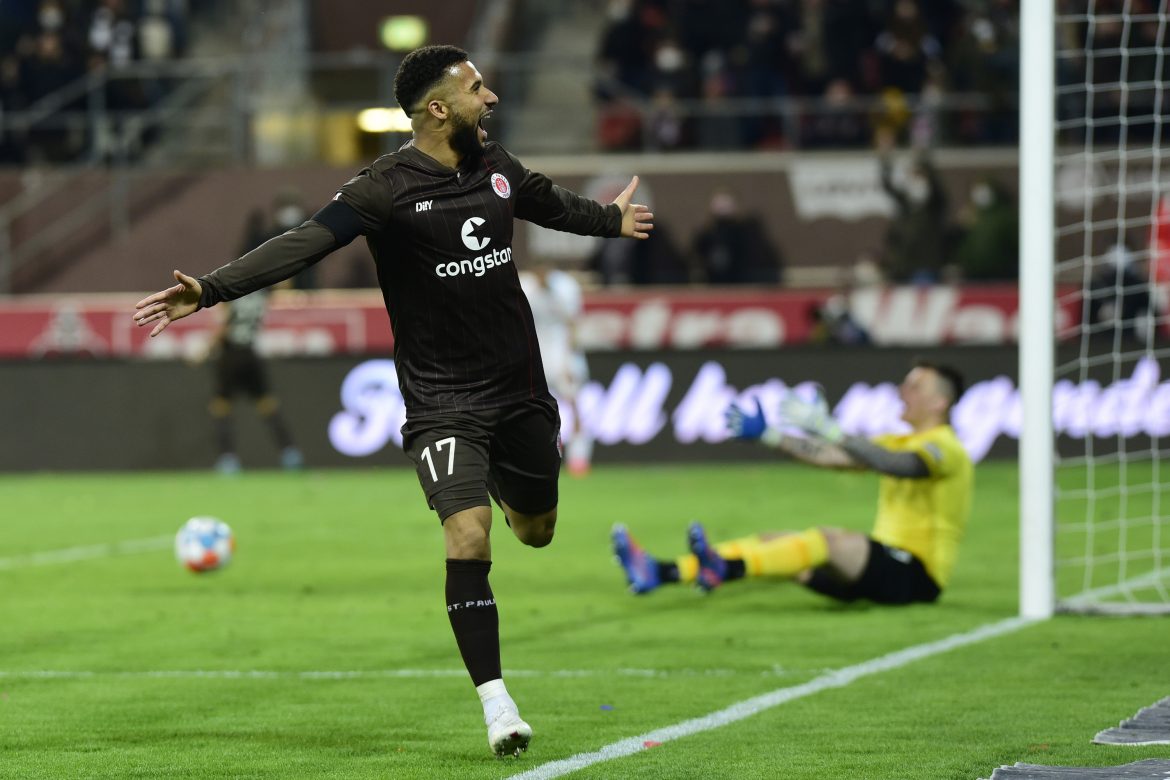

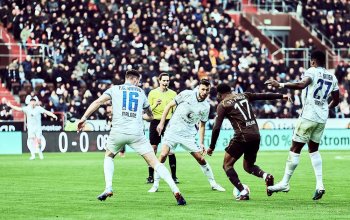
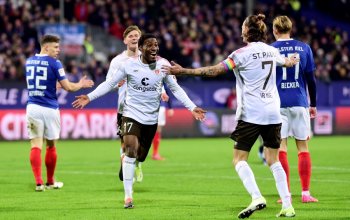
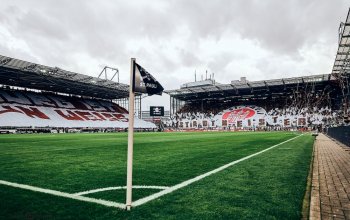
Sehr, sehr schöne Analyse eines – für mich – sehr schönen Spiels. Und ja, genau so spielt ein Aufsteiger! Man muss es nur noch siebenmal wiederholen.
Immer weiter vor!
Auf jeden Fall ein schönes und vor allem sehr spannendes Spiel!
Noch 4 Siege bis zum Aufstieg!
Yep, gut analysiert und durch die Erklärungen dieses Mal auch für mich verständlich. 😉
Danke Tim.
Mh, ich finde die Tabelle gerade geographisch schön geordnet. Wenn der Glubb morgen gewinnt, kommt man von St. Pauli über Bremen Darmstadt Nermbersch und Gelsenkirchen wieder zurück nach Hamburg. Faszinierend!
Immer Weiter Vor…